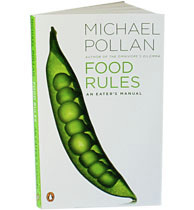Eat meals.
"Breakfast like a king, lunch like a prince, dinner like a pauper." The more physically active you are after a meal, the more of the energy in that meal your muscles will burn before your body stores it as fat. Some research suggests that eating close to bedtime elevates triglyceride levels in the blood, a marker for heart disease that is also implicated in weight gain.
Serve a proper portion and don't go back for seconds. Or if you really must have more, wait a few minutes and see what your body tells you.
Buy smaller plates & glasses. Research has found that switching from a 12" to 10" plate can decrease consumption by 22%.
Spend as much time enjoying the meal as it took to prepare it. This honors the cook who made the food and also helps you to slow down and savor it
"The banquet is in the first bite." Taking this adage to heart will help you to enjoy your food and eat more slowly. No other bite will taste as good as the first, and every subsequent bite will progressively diminish satisfaction. As you go on, you will be getting more calories, but not necessarily more pleasure.
Eat slowly. Not just so you'll be more likely to know when to stop, but to be more mindful of the eating experience. Enjoy the flavor and texture. Think about where the food came from, how it was raised, how it made it to the plate/bowl in front of you, and the work and consideration the person who made the meal put into it. This should be a pleasant experience. If you don't feel good thinking about those things while you're eating, maybe it's time to reconsider what you're consuming.
Consult your gut. It can take 20 minutes (after a meal) for your brain to figure out that you are full. Take your time while you eat and pay attention to your body - not just to what your sight and tast
Eat when you are hungry, not when you are bored. This is part of mindfulness. Try to be aware of WHY you are eating and ask yourself of you are really hungry before you eat again. Food should not be an antidepressant.
Stop eating before you're full. In Japan: 80% full is a good stopping point; in India: 75%; in China 70%...why hasn't America created a safe cut off point? Is it because the American dream is to consume as much as you want (and more than you need) because this land has such great resources? Is it because we are so proud of our cotton production, we want to show off by being able to squeeze into huge cotton clothes? Maybe at one point in time or probably not at all, but now we are (hopefully) more educated on the downside of monoculture, over use of fossil fuels, and obesity.
|

 RSS Feed
RSS Feed